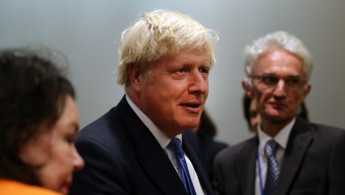Britain's Muslims angry about 'rampant Islamophobia' in the Tory party as Boris Johnson issues 'apology'
Later in the day on Wednesday, Prime Minister Johnson apologise "for all the hurt and offence that has been caused" and promised an independent inquiry into Islamophobia in the party despite claims by some the inquiry has been watered down.
The MCB's manifesto, published two weeks ahead of next month's general election, detailed how parties' policies affect Muslims across the UK.
The report said British Muslims care about issues that are "no different to those facing fellow Britons", such as Brexit, the National Health Service and the state of the economy.
But "there are serious concerns of the resurgence of the far right, together with growing Islamophobia from the governing party to sections of the media, which have shaped social attitudes about Muslims".
On Tuesday, the council responded to Chief Rabbi Ephraim Mirvis's comments on anti-semitism in the Labour party with its own statement.
"We agree with the Chief Rabbi’s observation that some politicians have shown courage but too many have sat silent," it said.
"As a faith community, we commonly are threatened by Islamophobia. This an issue that is particularly acute in the Conservative Party who have approached Islamophobia with denial, dismissal and deceit."
|
Wednesday's manifesto lays out 10 key pledges which the organisation is seeking from political parties. Top of the list is action to tackle Islamophobia and racism, followed by religious liberty and other issues such as safety at places of worship, refugees and discrimination.
Chief among their concerns is that the right of Muslims “to express their faith, be that in religious clothing, food and reasonable accommodation of religious observance” be defended.
Read also: There's no Islamophobia in the Tory party, because they don't believe it exists
Johnson came under fire in 2018 when he described Muslim women wearing burqas as looking like "letterboxes" and "bank robbers".
When asked to apologise for his comments on a Question Time leaders debate this week, he refused to do so, saying he had a "right to speak out".
But on the campaign trail in Cornwall on Wednesday, Prime Minister Johnson apologised for Islamophobia in the Conservative Party when asked about the issue.
"Of course, and for all the hurt and offence that has been caused – of course we do. And all that is intolerable and it’s so important as a country that we don't allow that kind of thing and that’s why we're going to have the independent inquiry," he said in comments published by the Guardian.
This came hours after Conservative MP Sayeeda Warsi, who was also the country's first female Muslim cabinet minister, admitted to the Guardian she felt as though she was in an "abusive relationship" with the party.
The Conservative Party leadership candidates pledged to pursue an independent inquiry into Islamophobia in the party earlier this year but this now seems to have been watered down into a general inquiry into prejudices.
Read also: Seven times Boris Johnson has offended minority groups
Around 20 Conservative Party members were suspended for posting Islamophobic content online in September.
More than half of the UK's Conservative Party members believe Islam is "generally a threat" to the British way of life, a new YouGov survey revealed in July.
|
Boris Johnson's career in journalism has also seen a host of other derogatory comments on Islam. In 2005, Johnson wrote in the Spectator that Islamophobia "seems a natural reaction" to any non-Muslim reading the Qur’an.
Following the London bombings he insisted the country accept "Islam is the problem".
Follow us on Twitter and Instagram to stay connected




 Follow the Middle East's top stories in English at The New Arab on Google News
Follow the Middle East's top stories in English at The New Arab on Google News


